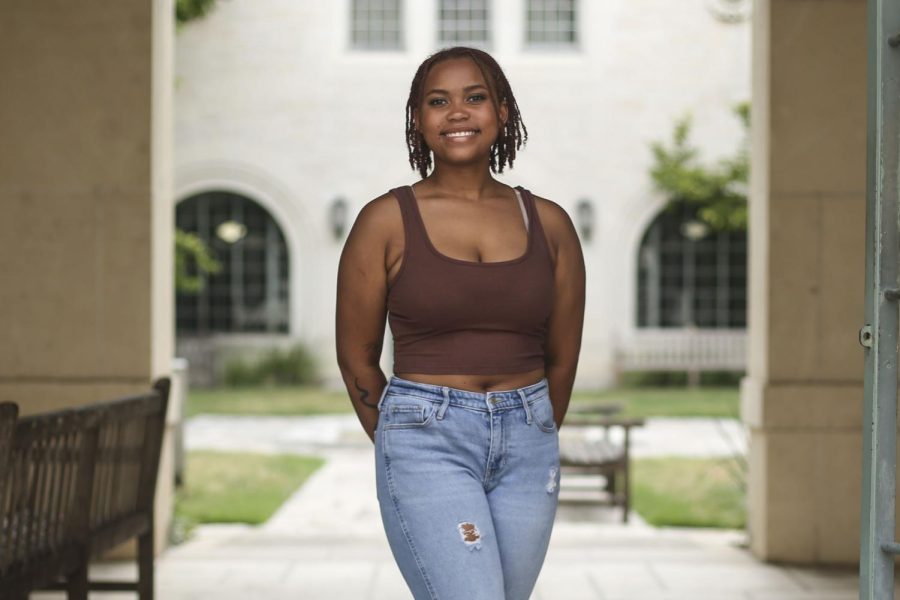‘You have to live a little bit more in fear’: UT students reflect on Black maternal health disparities
Government and African Diaspora studies junior Aria Kaylin Tolbert reflects on college life for Black women post Roe v. Wade.
July 14, 2022
Editor’s note: This article first appeared in the July 12, 2022 flipbook.
Since the U.S. Supreme Court overturned Roe v. Wade, Aria Kaylin Tolbert said losing her bodily autonomy has weighed heavily on her mind, particularly as a Black woman.
“I feel like it’s just an indicator of where things are going, where value is being placed in our society and who matters and who doesn’t,” said Tolbert, a government and African and African Diaspora studies junior. “It’s very depressing because it makes you wonder — if they can do this, then what’s next for me? What am I going to lose next?”
Last year, Texas passed a “trigger law” entitled the Human Life Protection Act, which creates a near-total ban on abortion that will go into effect 30 days after the Supreme Court releases an official judgment overturning Roe v. Wade. However, according to reproductive health experts, Texas’ abortion ban will affect some groups more than others.
Shaina Goodman, director for reproductive health and rights at the National Partnership for Women and Families, said even before the overturn of Roe v. Wade, Black women have had disproportionate barriers to accessing abortion care. She said banning abortion only increases these finanical and structural barriers.
“When we think about who is more likely in this country to have inadequate health care, to work in jobs that don’t provide a living wage, to be economically insecure, it’s really Black and brown communities who face those systemic structural barriers that are only exacerbated by lack of access to abortion care,” Goodman said.
Along with the financial issues that arise from unwanted pregnancy, Black women are at more risk than any other race in the U.S. for death and complications from pregnancy, according to a 2018 study on Black maternal health disparities by the National Partnership for Women and Families. The study also found that compared to white women, pregnancies are three to four times more likely to kill Black women and Black women are more likely to experience preventable pregnancy-related deaths.
Public relations sophomore Ophelia Brown said knowing the maternal health disparities for Black women makes her feel like the healthcare system is broken. Brown said she knows that if she got pregnant in college, her family would not support her. Since the overturn of Roe v. Wade, she said she is now exploring options for birth control.
“Not having (the choice to an abortion) makes me like if I make a mistake and end up in a bad position, that I won’t have any help,” Brown said. “And that’s scary.”
Goodman said disparities in healthcare are typically linked to the income and education level of the patient, yet this is not the case for Black women. The 2018 study also found that across all income and education levels, Black women face the same level of risk for pregnancy-related death and complications. Goodman said this is because of structural racism in the U.S. healthcare system.
“Black women — their pain is not taken seriously,” Goodman said. “When they say ‘Hey, something doesn’t feel right. I just delivered a baby and something feels off,’ that’s not taken seriously by medical systems or providers, and so the health risks that they’re experiencing are often overlooked.”
Tolbert said knowing the maternal health disparities for Black women gives her more to worry about if she were to become pregnant.
“We all know that sexual violence and things like that run rampant on college campuses, especially at bigger universities,” Tolbert said. “As a Black woman in college, you have to live a little bit more in fear and live a little bit more cautiously than I feel like you should have to or that you would want to.”
Goodman said the ability to have a choice in unwanted pregnancies also plays a large role in determining if someone goes to or finishes college. She said not having autonomy over one’s own body takes away a woman’s right to control her own life decisions.
“All you really have in the world is your own body,” Tolbert said. “That’s the only property that you’ll take with you from birth to death. So the fact that you no longer have any sort of authority over that, you’ve lost your control over your ability to make decisions for that — it’s a very scary thought.”









